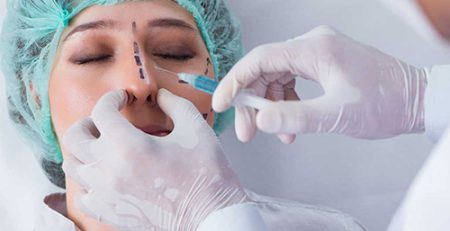ENT surgeon Talking about Rhinoplasty
What is Rhinoplasty?
Another name for Rhinoplasty is nose surgery. It involves changing the outer shaper or inner structure of your nose to improve its appearance or treat breathing issues. You can also call it a ‘nose job.’
There are three parts of a nose:
- Bone
- Skin
- Cartilage
Through Rhinoplasty, you can change all three of these according to your requirement or need. Moreover, there are two general types of nose procedures:
- Medical
- Cosmetic
An experienced ENT surgeon carries out the Rhinoplasty. In comparison, cosmetic nose procedures involve modifying the shape of your nose for the sake of beautifying its appearance.
What is Rhinoplasty for?
There are either medical reasons or cosmetic purposes for Rhinoplasty surgery. Shared below are the most common reasons to performed for nose surgery:
- Changing the size of the nose to your facial structure
- Changing nose width or the size and position of your nostrils
- Treatment of enlarged, upturned, or hooked nasal tips
- Treating large or wide nostrils
- Treating nasal asymmetry or deformity
What are the Risks factors with Rhinoplasty ask from ENT Surgeon?
Any major nose procedure can involve the risks of:
- Nose Bleeding
- Nasal Infection
- An adverse or unexpected reaction to the given anesthesia
The above are the significant risks that might be uncontrollable. However, the following are the risks that you might suffer from because of an unexperienced surgeon:
- Temporary or permanent difficulty in breathing through your nose
- Temporary or permanent numbness in and around your nose area
- An uneven or deformed looking nose
- Persistent pain, swelling, or discoloration
- Permanent scarring due to carelessness
- Possible need for an additional nose job
First, you must talk all of these out and discuss them with your surgeon before going under the knife.
How to Prepare Patients before Nasal Surgery/Nose Job?
Discussion
Before going for the surgery, meet with your surgeon and discuss the pros and cons of nasal surgery. You can:
- Discuss your medical history
- Go for a physical examination
- Take photographs to see the before and after results
- Discuss what you are expecting from the surgery
After Rhinoplasty/nasal surgery, you might feel the after-effects of anesthesia as it can cause:
- Slowed reaction
- Dizziness
- Memory lapses
- Impaired judgment
These effects depend on how strong the anesthesia was and the number of dosages.
Food and Medications you can take
Avoid self-medications. Do not take medicines that contain aspirin or ibuprofen (two weeks before and two weeks after the surgery or as per the ENT specialist’s recommendation. The reason for it is that these particular medicines can cause an increase in bleeding. Patients that are going to do Rhinoplasty must only take medications that their ENT or cosmetic surgeon prescribes. Moreover, herbal remedies are also popular as they can prove beneficial in soothing aches.
What can you expect from the surgery?
In Rhinoplasty, each surgery is unique and different from the other. Therefore, there are no defined steps that take place. It depends on the anatomy of the surgery and the surgeon that is performing it.
During the Surgery
When you go for nasal surgery, then expect to be given one of the following anesthesia:
- Local anesthesia with sedation
It is a sedative that helps numb a specific area, an area that is under the surgery region. Additionally, pain-relieving medicines and sedatives are also there to help in this regard. This type of anesthesia causes grogginess, but you do not sleep soundly.
- General anesthesia
With the help of an IV line, the ENT surgeon will inject a drug-based anesthetic into the patient’s body i.e.
- Hand
- Neck
- Chest
It affects your entire body and makes you completely lose consciousness. Additionally, a breathing tube is used that makes breathing easier.
After the nasal procedure, you can expect to rest on a complete bed for a while. Your nose may feel congested due to the swelling. Moreover, there may be a slight difficulty breathing, and mucus might flow from your nose, but that is all temporary.
Pros and Cons of Rhinoplasty
Following are the advantages that may come from Rhinoplasty:
- More self-esteem
- Treatment of breathing issues
- Correction of birth deformities
- Improved breathing leads to a better quality of life
Now that you know the advantages of a nose job, here are some of the cons or disadvantages of Rhinoplasty surgery:
- Minor aches
- Temporary difficulty in breathing
- Special post-surgery care
So, now you know what Rhinoplasty is and how it can benefit you and improve your quality of life. Moreover, always consult an experienced, well-reputed ENT surgeon for Rhinoplasty. An experienced otolaryngologist will help avoid any accidents or unrepairable damage.






